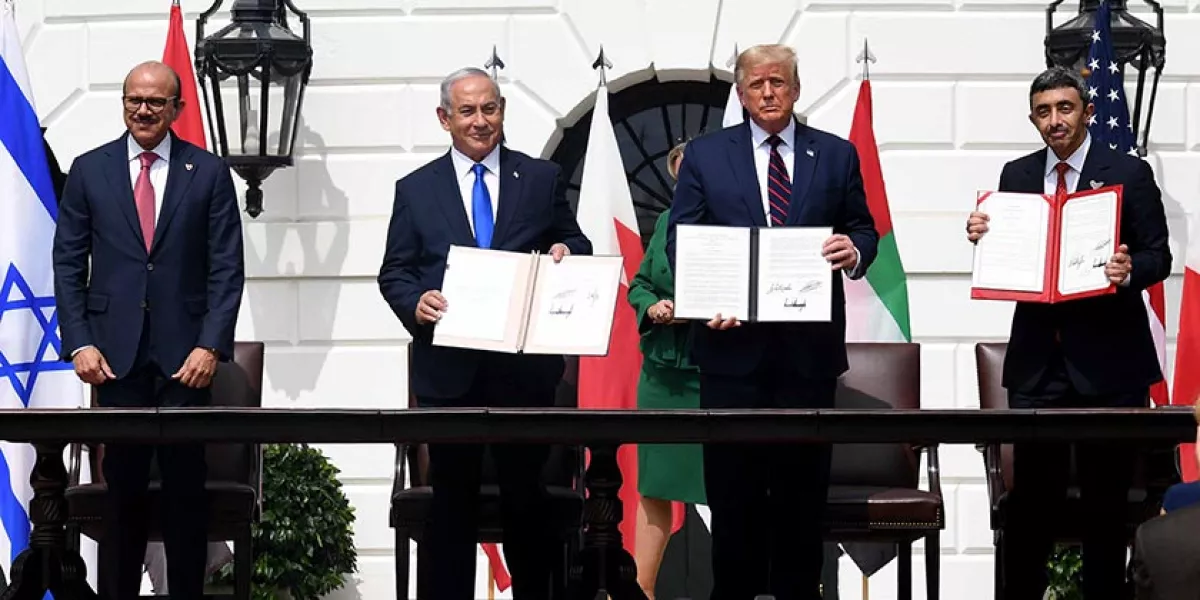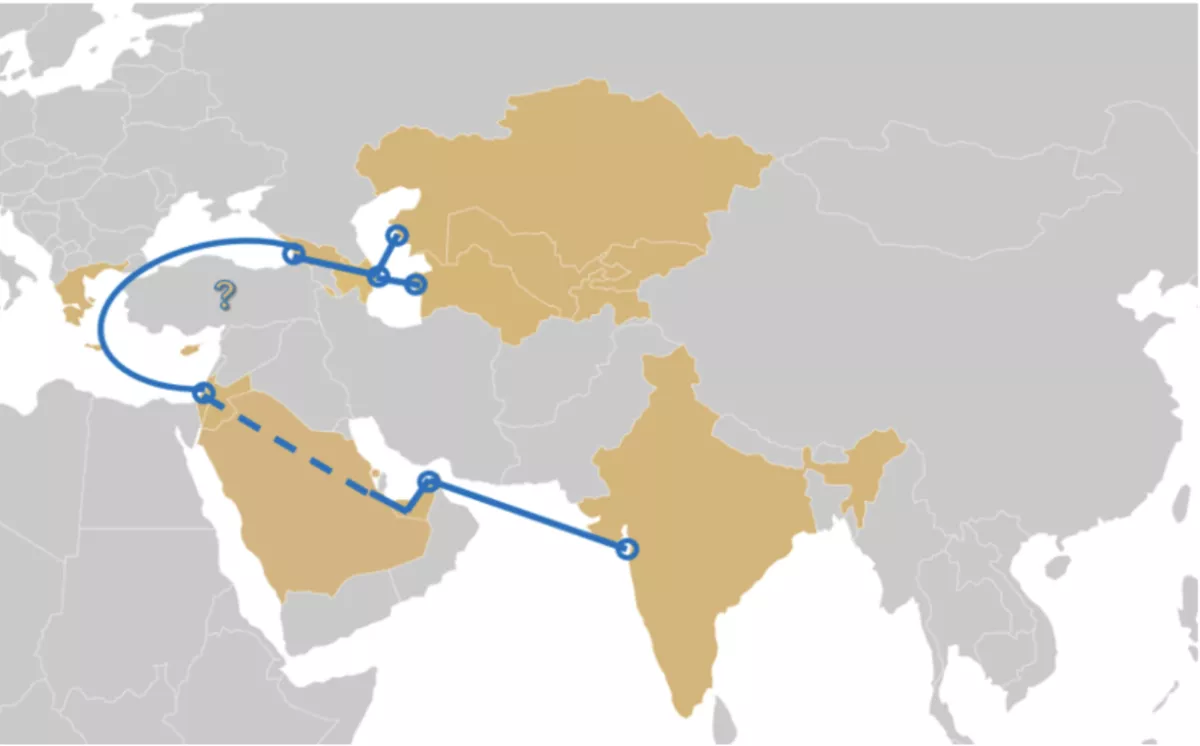Reconfiguring Eurasian trade: Azerbaijan's key role in expanded Abraham Accords Article by CACI Analyst
US-based The Central Asia-Caucasus Analyst (CACI Analyst) has published an article by Michael Tanchum discussing the potential inclusion of Azerbaijan in the Abraham Accords. Caliber.Az presents an analysis of the piece.
The article from the CACI Analyst offers a detailed analysis of the potential inclusion of Azerbaijan in the Abraham Accords and its broader implications for geopolitics, trade, and strategic alliances in the Middle East and Central Asia. The author, Michael Tanchum, makes the case that Azerbaijan's entry into a larger Abraham Accords framework could reshape commercial corridors, boost economic cooperation, and challenge China's expanding influence in the region.
The article highlights the strategic importance of Azerbaijan in the context of global connectivity. The Eastern Mediterranean and Black Sea are depicted as a natural waterway forming the core of a multi-modal connectivity arc that could function as a transportation backbone for the Middle East and Central Asia. The key thesis here is that by joining the Abraham Accords, Azerbaijan could play a central role in a broader geopolitical and economic shift, particularly in terms of commercial cooperation spanning from India to Europe, and in countering China’s westward economic expansion.
The inclusion of Azerbaijan in the Abraham Accords is argued to be not only a response to regional security threats, notably the growing tensions with Iran, but also a long-term strategic opportunity. Azerbaijan’s close relationships with both Israel and Türkiye, and its role as a key supplier of oil to Israel, make it a natural partner in this expanded framework. The article also points out that Azerbaijan’s port on the Caspian Sea and Israel’s ports on the Eastern Mediterranean could serve as anchor points for an enhanced trade route known as the India-Middle East-Europe Corridor (IMEC), connecting Central Asia to global markets.
Several key quotes from the article underline the significance of Azerbaijan's potential involvement in the Abraham Accords. For instance, Tanchum notes that "Azerbaijan’s inclusion in a wider Abraham Accords framework could radically reconfigure trade patterns and manufacturing value chains across the southern rim of Eurasia, to the benefit of US strategic interests and those of its partners." This encapsulates the central argument that Azerbaijan’s inclusion would not only offer economic benefits but also serve the broader strategic interests of the US and its allies, particularly in the face of rising geopolitical competition from China.
The analysis emphasizes the robust defence cooperation between Azerbaijan and Israel, a relationship rooted in mutual concerns about Iran’s regional influence. This defence cooperation forms a solid foundation for deepening economic ties between the countries. Furthermore, Azerbaijan's role in mediating between Israel and Türkiye is another factor contributing to its strategic importance in the region.

The author also ties in the broader context of multilateral cooperation, such as the I2U2 framework (India, Israel, the UAE, and the US), which has already started to build economic linkages between the countries involved. The potential for Azerbaijan to be included in this extended framework is discussed in light of its growing economic relations with the UAE, which is its top Arab trading partner. This is exemplified by the UAE’s investments in Azerbaijan, such as the acquisition of a stake in Azerbaijan's Absheron natural gas field, as well as its growing role in the development of Azerbaijan’s infrastructure and transport networks.
Tanchum’s article also addresses the broader geo-economic logic behind including Azerbaijan in the Abraham Accords. He notes that commercial corridors, such as the IMEC, rely heavily on large investments in infrastructure and the integration of manufacturing value chains. In this sense, Azerbaijan’s potential role in the IMEC could be key in linking Central Asia to the global economy, thereby presenting India with an alternative trade route to access the region, bypassing traditional reliance on Iran or Russia.
The potential for Azerbaijan to serve as a crucial link in the Trans-Caspian International Transport Route (TITR), also referred to as the Middle Corridor, is a key aspect of the analysis. By connecting the Caspian Sea to the Black Sea, this route provides an alternative to China’s Northern Corridor for trade between China and Europe. Linking the IMEC to the TITR would enable India to compete with China for influence in Central Asia and beyond, a strategic goal that India has long pursued.
The author also discusses the role of the UAE in supporting Azerbaijan’s inclusion in the Abraham Accords, citing the UAE’s extensive economic and commercial ties with both Azerbaijan and Georgia. The UAE's investments in infrastructure, particularly in port development, are critical in facilitating the connections between Azerbaijan and Central Asia, and the article outlines how the UAE’s involvement is crucial in expanding the regional economic framework.

Finally, the article outlines a roadmap for the future of this cooperation, suggesting the creation of a summit involving Azerbaijan and Georgia, potentially expanding to include Central Asian countries and other key regional players. This expansion would facilitate the growth of joint venture manufacturing investments and commercial cooperation, reinforcing the argument that the US can use Azerbaijan's inclusion in the Abraham Accords as a tool to shift the balance of power in Eurasia.
In conclusion, the article presents a compelling argument for Azerbaijan’s inclusion in the Abraham Accords, emphasizing the strategic, economic, and geopolitical benefits for both Azerbaijan and the broader region. It suggests that the expansion of this framework could be a game-changer for the geopolitical landscape of the Middle East and Central Asia, providing counterweight to Chinese dominance and offering new avenues for economic growth and regional cooperation. The quotes retained in the article, such as "Azerbaijan’s inclusion in a wider Abraham Accords framework could radically reconfigure trade patterns and manufacturing value chains," effectively encapsulate the article’s overarching argument that this strategic shift could reshape regional dynamics for years to come.
Professor Michaël Tanchum teaches international relations of the Middle East and North Africa at the University of Navarra, Spain and an associate fellow in the Economics and Energy at the Middle East Institute in Washington, D.C. He is also a Senior Associate Fellow at the Austrian Institute for European and Security Studies (AIES) and an affiliated scholar of the Centre for Strategic Policy Implementation at Başkent University in Ankara, Türkiye (Başkent-SAM) and the NTU-SBF Centre for African Studies in Singapore.








